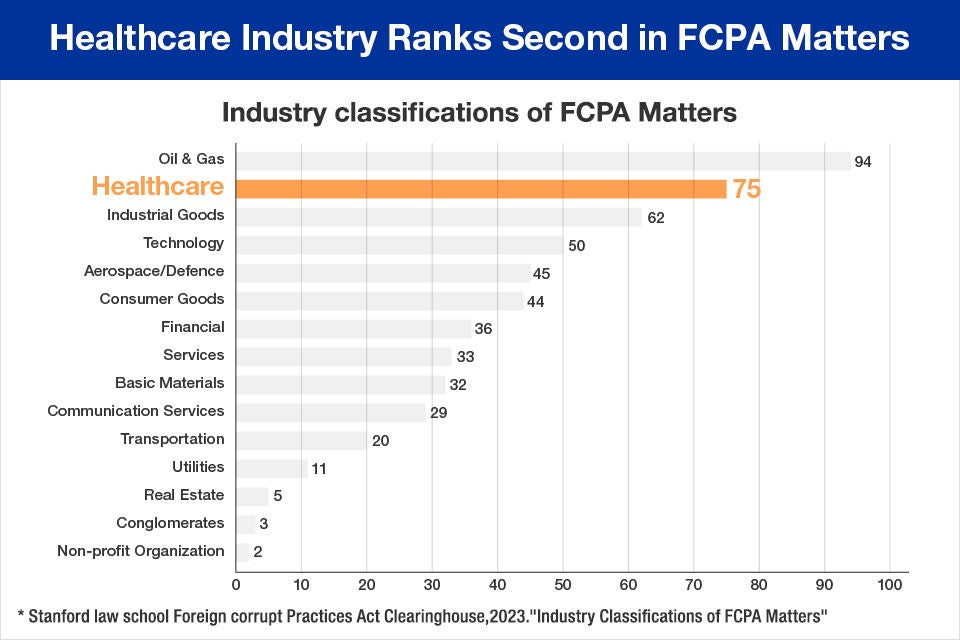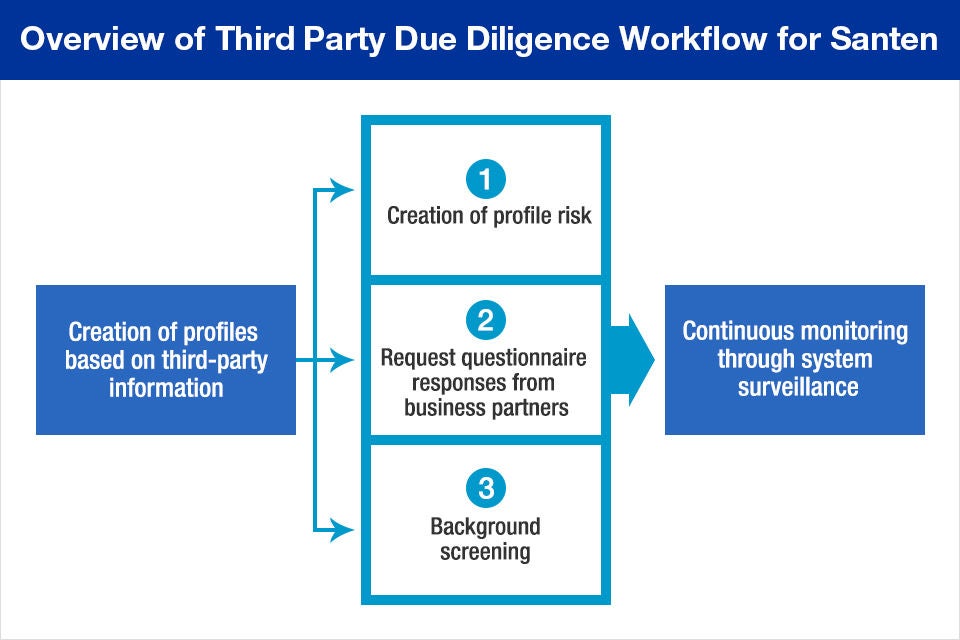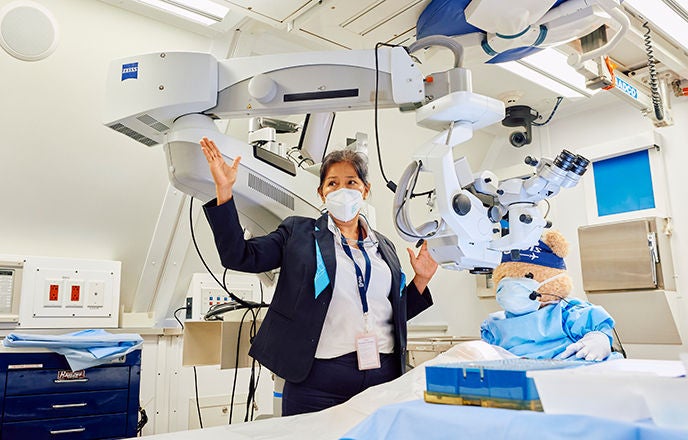Legal & Compliance Global Head of Compliance,
Vice President
Robert Van Leer
Santen is engaged in research and development, manufacturing, and sales and marketing of pharmaceutical products in the field of ophthalmology on a global basis, operating in more than 60 countries and regions worldwide, manufacturing approximately 400 million units of eye drops annually, and supporting the eye health of approximately 50 million people.
All aspects of Santen’s business involve frequent interaction with public officials, healthcare professionals, and the like, and we are required to ensure a high level of transparency in our corporate activities. We believe it is essential to place integrity and ethics at the center of all our business activities not to cause bribery and any corruption in interactions with them.
To build and maintain relationships of trust in our transparent business activities, we have introduced a globally unified due diligence program for third-party (business partner) management to properly manage bribery and corruption risks —let’s take a closer look.
Business Risk and the Significance of Third Party Due Diligence
Third-party due diligence refers to the process of investigating the background and reputation of a company with whom we do business or with whom we partner, and establishing and maintaining a compliant and sustainable business relationship. A robust anti-bribery and anti-corruption program for our engagement with third parties is essential, especially for healthcare companies, and is required by social and executive agencies. Every company operating globally understands the respective laws, cultures, and social responsibilities of the individual countries and regions in which it operates before implementing such a program.
Santen's strengthening of third-party DD is in line with international anti-bribery and anti-corruption laws and regulations which are becoming increasingly stringent, such as the U.S. Foreign Corrupt Practices Act (FCPA).
Under these regulations, if a third party—such as a business partner that has entered into a contract with a company and conducts business with it—commits corruptive actions, then in many cases that company will also be held liable. In particular, bribery and corruption can seriously damage a company’s reputation and undermine the trust that society has placed in it.
Bribery and corruption can occur all over the world. Laws against bribery have been enacted in almost every country/region in which Santen does business, and enforcement of these laws is getting stronger, including in Japan. Enforcement is extremely robust under the FCPA and other laws that are applied extraterritorially, and fines and other penalties are considerable. The healthcare industry is unusually susceptible to bribery due to frequent contact with foreign public officials and others; in fact, reports indicate that the healthcare industry ranks second among 15 industries in terms of the number of FCPA enforcement cases that have occurred since the act went into effect.

As such, Santen has been working on this third-party DD program since last year, establishing globally uniform guidelines, introducing risk-checking tools, and promoting employee training to enhance due diligence for our engagement with third parties.
Verification of business partner transparency via a “risk-based approach” that adjusts response to the degree of risk
Since laws and business customs differ from country to country, making it difficult to evaluate business partners based on uniform criteria, Santen has adopted a “risk-based approach” that focuses on and rigorously investigates business partners that are considered to be of particularly high-risk—such as companies in countries or industries where bribery is commonplace. Regulatory authorities worldwide recommend this risk-based approach to management.

Santen’s progress toward establishing a compliance system that responds to diverse risks
Robert Van Leer and Mayumi Yamada of Legal & Compliance, who are leading the third-party due diligence effort, had the following comments:

“Risk assessment varies significantly across countries and regions due to differing legal frameworks, enforcement practices, cultural attitudes towards bribery and corruption, and levels of political and economic stability. There is also a noticeable shift towards digital tools for compliance monitoring, which is being embraced unevenly across regions.
Establishing a global governance structure is critical to managing the complex and changing risks associated with Santen's rapid globalization and entry into new disease areas. As Santen enters a new market with higher corruption risks, the global governance structure will allow for rapid deployment of an enhanced DD process and more stringent controls.
We believe that by building a proactive compliance structure, we can ensure that patients always receive safe, effective, and ethically developed treatments.”

Legal & Compliance
Global Compliance Manager
Mayumi Yamada
“When building and implementing this program, gaining the understanding of employees in other departments was essential. Even within the same compliance department, we faced challenges such as the strictness of laws and regulations that must be observed in each region, so we had many discussions between the departments involved and put every effort into creating the program.
When it came time to implement the program, we found that it was difficult to apply a uniform SOP depending on the type of business partners targeted and the corruption situation in each country or region, so we tried to optimize the program to be more suitable for Santen while properly articulating bribery risks in various places.
Compliance is often seen as a brake on business, but once a compliance risk materializes, it not only causes irreparable legal and social damage, but it also prevents Santen from continuing to provide value to patients and society, who are waiting for our products and services. We hope to live up to the trust and expectations of society through the proper operation of the program.”
Contributing to the sustainable development of society based on our Core Principle
We believe that it is necessary to clearly judge what should be done after taking into account not only the provisions of the law but also the social issues behind it.
Corruption and bribery involving healthcare professionals and government officials are major social issues in many countries as the result of which social healthcare system is distorted and many patients, doctors, and people may be deprived of access to proper healthcare. We believe that it is not enough for Santen to confront this problem alone; we need to “influence and involve” everyone Santen engages with, and we all need to do business the right way for the good of society.
To achieve further growth as a company and to contribute to the sustainable development of society as a whole, Santen will continue to enhance its global compliance capability, not only with corruption and bribery but also to address new risks and to improve employee education.



